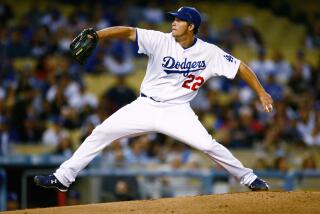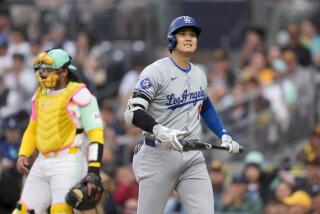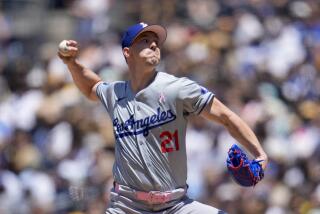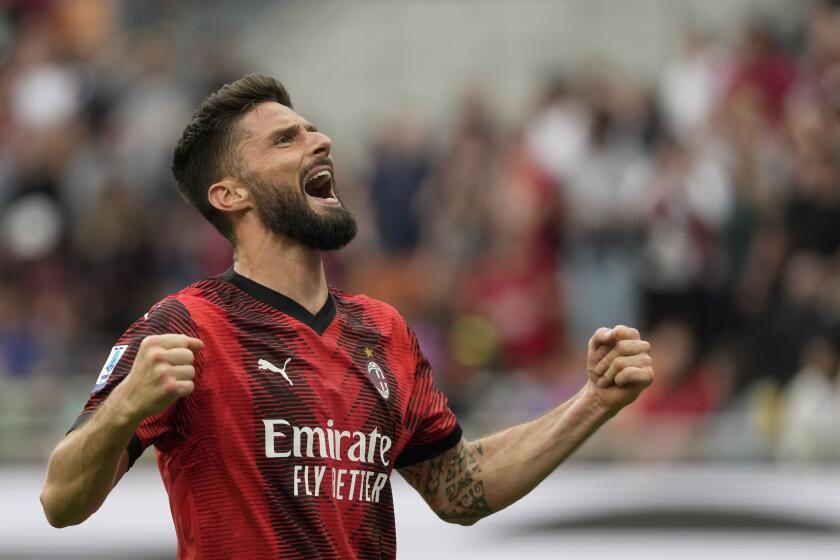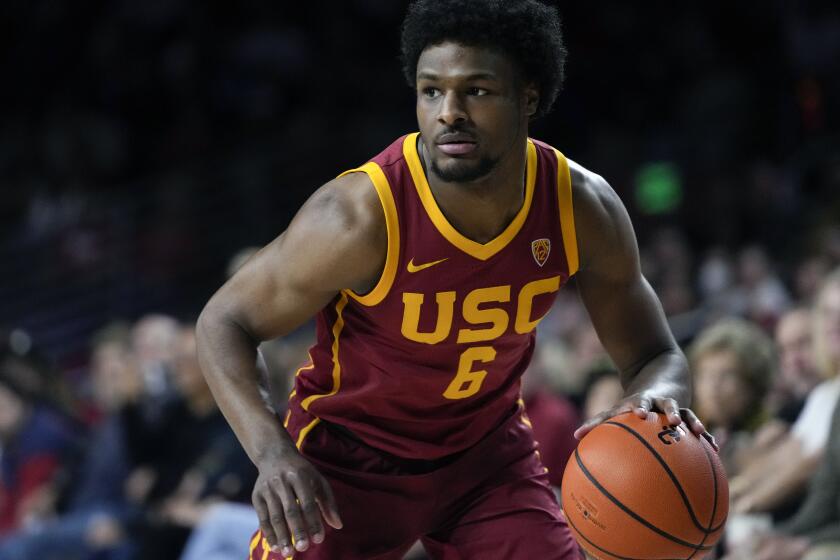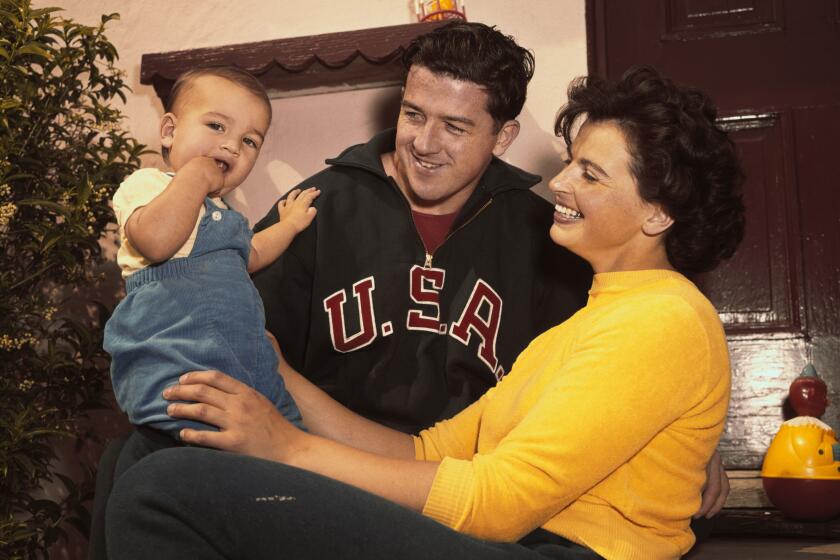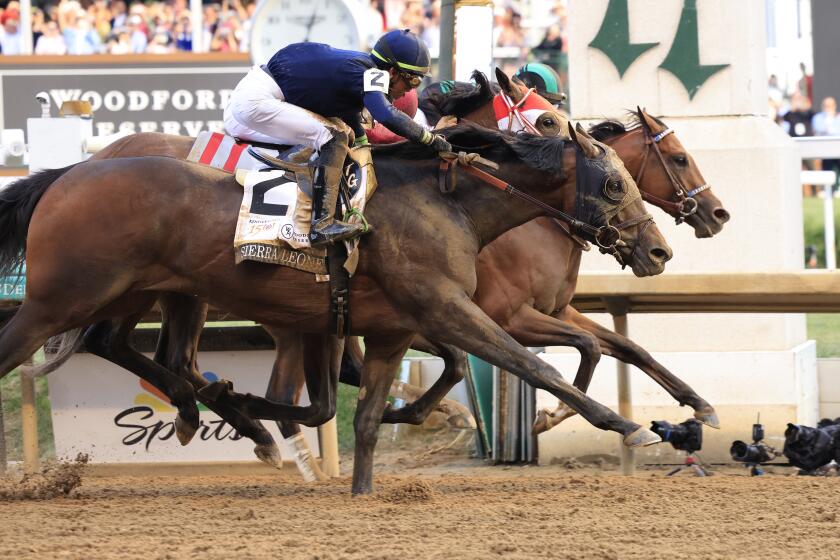Baseball Players Claim Meeting Unites Them
The mood was somber and the looks were stern Tuesday morning when major league players filtered slowly into their meeting room to discuss labor negotiations with union executive director Don Fehr.
It was upsetting enough that this was Day 13 of the owners’ lockout of spring training, but suddenly reports were drifting in that the solidarity of the Major League Players Assn. was eroding.
“I guess we’ll find out today just how strong we are in this thing,” said Ken Phelps of the Oakland Athletics as he entered the room. “There are guys that are upset about what’s happening, and now we’ll find out just where we stand.”
Whatever rifts there were, soon disappeared, turning a union executive board meeting into a virtual pep rally.
“I think there were guys that went into the meeting with the tendency of thinking that it might be best to give it up,” said A’s pitcher Dave Stewart, “but we left the meeting feeling united and strong.”
There was not a single player, they insisted, who disagreed with the union’s stance. Pitcher Scott Sanderson of the Chicago Cubs and catcher Bob Boone of the Kansas City Royals were the most vocal players during the meeting, Stewart said, informing the group of the importance of solidarity.
Gene Orza, associate general counsel of the players’ association, said: “I would characterize this as a meeting the owners wish had never taken place. One hundred players walked out of there more determined than ever.
“It’s not a good spring to be an owner.”
The players from all 26 teams who came to what normally is a spring-training city this time of year, discussed the labor negotiations for four hours before adjourning at 1:30 p.m., PST. Fehr will take his harmony tour to Los Angeles, where he is expected to hold a meeting either tonight or Thursday morning at a hotel to be determined, then depart for Tampa, Fla., for one last meeting before heading back to New York.
When Fehr will meet again with the owners’ Player Relations Committee for the next round of negotiations, and who will initiate the next conversation, he said, is anyone’s guess.
“Who’s going to ask who to dance first,” Fehr said, “is just about the silliest way to determine when you’re going to negotiate again that I can imagine. Let’s hope we haven’t descended to that. . . .
“But something is wrong when 26 (owners) can have so much power and order a lockout without letting it bother them. They don’t seem to care. They’re going to their country clubs anyway. There’s something wrong with that attitude.”
For the first time, the players gave the impression of being prepared to sit out for however long the owners choose.
“They’re the ones who locked us out,” said infielder Paul Molitor of the Milwaukee Brewers. “No one’s stopping them from opening camp. We can go back to work tomorrow, but if they don’t want to, that’s their prerogative.
“None of us are crying about it.”
It is not clear when opening day would have to be postponed because of the continuation of a lockout, but some players said that a minimum of four weeks would be required before they would play in a regular-season game.
“We’re not going to make a mockery of the game because they cheated us out of time,” Molitor said.
Said outfielder Joe Carter of the San Diego Padres: “Right now, that’s the owners’ problem, not ours.”
There remains the possibility that Commissioner Fay Vincent could order spring-training camps to open while negotiations continue, but Fehr said it’s unlikely.
“I don’t know why anybody is referring to Chuck O’Connor as the (owners’) negotiating representative,” Fehr said. “He’s clearly not the chief negotiator anymore. The commissioner is clearly management’s representative.
“That’s refreshing in a way, because there’s no pretense about it now.”
Although the issue of arbitration eligibility has become the primary focus of attention during the recent negotiations, Fehr and the players refuse to say that reducing the three-year arbitration rule to two years is any more important than the following:
--Expanding the rosters from 24 to 25 players.
--Increasing the pension benefits from $61 million to $62 million.
--Raising the minimum salary from $68,000 to $112,000.
--Providing free agency to players who are sent outright from major league rosters to the minors.
“We have to look at the total picture, not just one issue, because they’re all related,” said Padre pitcher Dennis Rasmussen. “Minimum salary affects arbitration. Arbitration affects free agency. Free agency affects outright assignments. And outright assignments affect the pension plan.”
Is there a chance the players’ association would agree to a settlement if all their demands were met, without the arbitration eligibility being reduced to two years?
“The players believe they gave up their year of eligibility (in 1985) under false pretenses,” Orza said, “and now they want it back. And they’re willing to struggle toward that end.
“It would be different if the industry’s health and welfare demanded, somehow, for that . . . to persist, but 1990 represented the greatest year in 115 years of the sport economically. How could we justify giving up that concession?
“I think we’re at a stage right now where we need one of two different kinds of people, and they’re very, very hard to find. One is an inventor, and the other is a miracle worker.”
Certainly, if the players in Tuesday’s meeting are frightened by the possibility of lost income because the lockout might continue past opening day, they showed no signs. There was no discussion about drawing from their strike fund, and the only money they will receive from the union before opening day is $5,000 in licensing fees. Those checks will be mailed about March 14, Fehr said, and those who were not in the big leagues during the entire 1989 season will receive less.
The players also were informed that even though many are not scheduled to be paid in the event of a lockout during the season, Orza said the lockout language in contracts is a violation of the Basic Agreement and will be challenged in court.
“I think everything went just great today,” Angel pitcher Bert Blyleven said. “By the time this is over, I think we’ll be more unified than we’ve ever been.”
The National League told the Dodgers that until further notice no spring training games will be played until 10 days of spring training have elapsed.
Accordingly, the Dodgers announced the cancellation of the first five home exhibition games. The San Diego Padres earlier canceled a four-game series against the Angels that was to start Friday in Yuma, Ariz.
Several other clubs that train in Florida started canceling games. The Detroit Tigers and St. Louis Cardinals won’t play their first five scheduled games, and the Chicago White Sox and Atlanta Braves canceled their first four home games.
The Philadelphia Phillies and New York Mets each called off their first three homes games, and the Texas Rangers canceled Thursday’s game against Edison College in Fort Myers, Fla.
Among of the lockout’s victims is the Northern California Earthquake Fund, which was to receive the proceeds from the exhibition between the Oakland Athletics and San Francisco Giants in Phoenix Thursday. About 6,000 tickets were sold for the game.
More to Read
Get our high school sports newsletter
Prep Rally is devoted to the SoCal high school sports experience, bringing you scores, stories and a behind-the-scenes look at what makes prep sports so popular.
You may occasionally receive promotional content from the Los Angeles Times.
